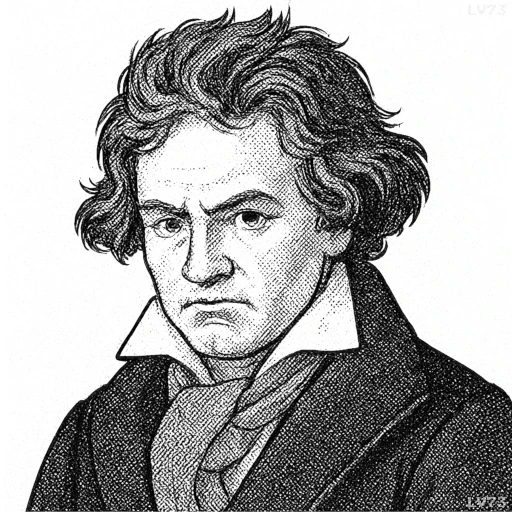“Music should strike fire from the heart of man, and bring tears from the eyes of woman.”

- December 16, 1770 – March 26, 1827
- Born in Germany (Holy Roman Empire)
- Composer, pianist
table of contents
Quote
“Music should strike fire from the heart of man, and bring tears from the eyes of woman.”
Explanation
In this quote, Beethoven conveys his belief that music has the power to deeply affect human emotions, evoking both passion and sensitivity. By saying that music should “strike fire” from the heart of man, Beethoven suggests that it should ignite a strong, intense response, stirring deep emotion and stirring the soul. On the other hand, the reference to “tears from the eyes of woman” evokes the idea that music should also move people to tears, bringing out a sense of vulnerability and emotional depth. This distinction between man and woman may reflect the different ways in which Beethoven perceived the emotional experience of music—one that can be both powerful and deeply moving, resonating with people on a universal level, regardless of gender.
This sentiment underscores Beethoven’s view of music not just as an art form, but as a medium that can transform and connect people. For him, music was a language capable of expressing the deepest aspects of the human experience, whether that be joy, sorrow, or the burning intensity of love. In a modern context, this quote can be applied to the way music continues to have the power to unite people from different walks of life, breaking through barriers and evoking emotions that words alone cannot. Beethoven’s insistence on music’s emotional power remains a defining feature of art today—whether through symphonies, songs, or instrumental pieces, music continues to move people in profound ways.
Beethoven himself, despite his hearing loss, was able to compose music that stirred the hearts of listeners, showing that music’s ability to communicate emotion transcends not just personal limitation but also social and cultural barriers. In modern times, this quote can remind us that art, particularly music, remains one of the most powerful ways to touch and elevate the human spirit, whether through the raw intensity of a powerful orchestral piece or the tender emotion of a delicate song. Through such expression, music continues to serve as a universal language, capable of evoking deep and transformative emotions.
Would you like to share your impressions or related stories about this quote in the comments section?

